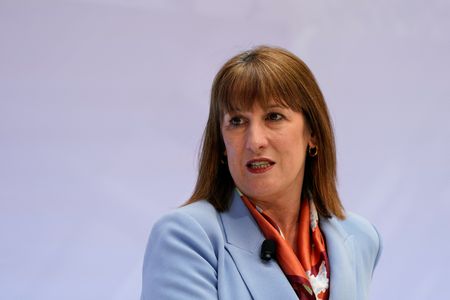By David Milliken
LONDON (Reuters) -British finance minister Rachel Reeves will have to juggle competing calls to boost growth and tackle immediate social needs when she divides up a 100 billion pound ($134 billion) investment pot in June, a think tank said on Tuesday.
The Resolution Foundation estimates Reeves will have just 20 billion pounds left over if she allows existing government capital budgets to keep up with inflation and the growing population and also sticks to plans for more defence investment.
The 100 billion pounds of extra capital spending planned for the next five years – partly funded by the biggest tax rises in three decades – formed the centrepiece of Reeves’ October 2024 budget and will be divided between government departments in a spending review due in June.
However, the think tank said the money would go less far than the public might expect, because of a past stop-start approach to investment that had left Britain with the second-lowest number of hospital beds per person among its peers and prisons that are already 10% over capacity.
“While the over 100 billion pound boost announced at the last Budget sounds like a lot, it’s not enough to fund all our economic infrastructure needs and rebuild Britain’s fraying public services,” said Resolution Foundation research director James Smith, a former Bank of England economist.
The think tank, which focuses on issues affecting low earners, said higher investment in schools and hospitals would be of more immediate benefit for poorer Britons who use these services twice as much as their richer peers.
But economic studies predicted that investment in areas such as transport and energy infrastructure typically delivers faster growth in the long run. A 1% of gross domestic product boost to this type of infrastructure lifts output by 4.9% versus 3.5% for investment in social infrastructure such as schools, hospitals and social housing.
The report said one approach could be to focus social investment on areas with particular benefits for productivity, such as social housing shortages in cities and healthcare for adults who are out of work.
($1 = 0.7487 pounds)
(Reporting by David Milliken; editing by Suban Abdulla)











